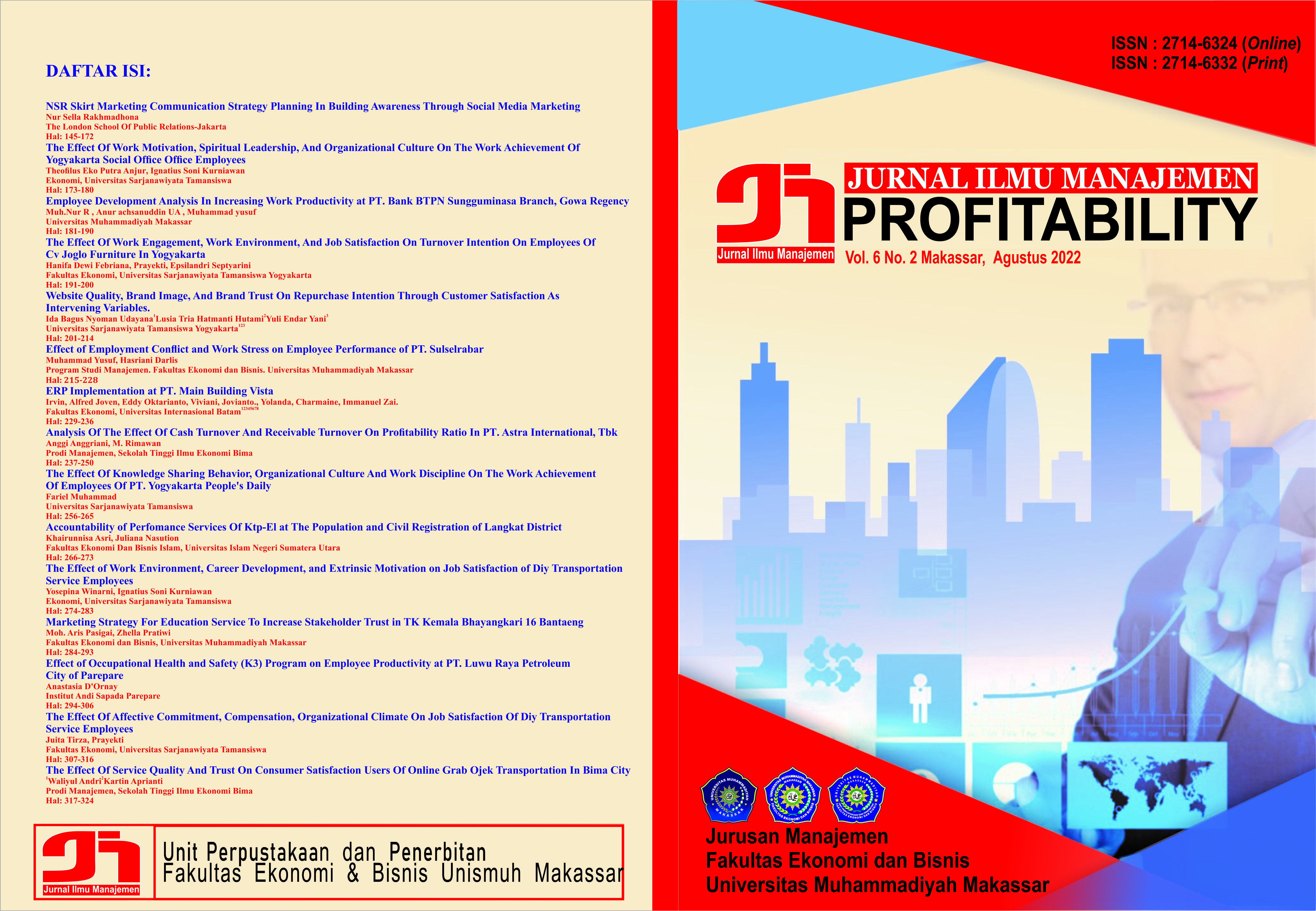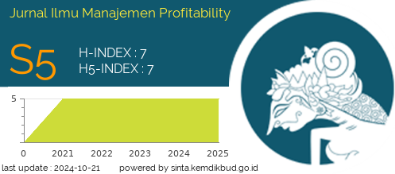Implementation of Good Corporate Governance towards Productive Zakat Distribution at BAZNAS Kab. Majene (Sharia Economic Review)
DOI: https://doi.org/10.26618/profitability.v9i1.15371
Implementation of Good Corporate Governance, Productive Zakat Distribution
Abstract
This research analyzes the implementation of Good Corporate Governance towards the distribution of productive zakat in BAZNAS Kab. Majene (Sharia Economic Review). The aim of this research is to determine the productive zakat distribution system, the implementation of Good Corporate Governance and an overview of sharia economics at BAZNAS Kab. Majene. The research method used is a qualitative method. The research results show that (1). Management of productive zakat funds goes through the stages of planning, implementation, control (evaluation), reporting and accountability. Collecting productive zakat funds at BAZNAS BAZNAS Majene Regency is through socialization, forming zakat collection or payments that do not yet use application features to facilitate transactions between Muzakki and zakat Amil so that zakat Amil still use a manual system. (2). BAZNAS Kab. Manjene has implemented the principles of good corporate governance in the distribution of zakat funds. BAZNAS District. Manjene routinely provides open financial reports to the muzakki, divides the organizational structure and assigns tasks according to areas of expertise, zakat distribution is in accordance with the institutions responsible for the muzakki and the needs of the mustahik. (3). Distribution of productive zakat at BAZNAS Kab. In carrying out its duties, Manjene has implemented GCG, carried out its duties honestly, responsibly, disciplined and sincere, these characteristics are a description of the characteristics of tabligh, trust, fatonah and siddiq. The distribution of professional zakat is not fully in accordance with the Qur'an because it is mostly distributed to the poo.
References
Alifiyah. (2024). Analisis Implementasi Good Amil Governance Berdasarkan Zakat Core Principle di Lembaga Amil Zakat. Jurnal Warta Ekonomi, Vol. 7.
Amelia, E. (2020). Penyaluran Dana Zakat Produktif Melalui Pola Pembiayaan. Prestasi Pustakarya.
Arikunto, S. (2013). Prosedur Penelitian: Suatu Pendekatan Praktik,. Rineka Cipata,.
Basrowi, & Surwardi. (2008). Memahami Penelitian Kualitatif. Rineka Indah.
Erliyanti. (2019). Pendistribusian dan Pengelolaan Zakat Produktif Sebagai Pemberdayaan Ekonomi Umat. Jurnal Warta Edisi.
Fahmi, I. (2017). Etika Bisnis: Teori, Kasus, dan Solusi. Alfabeta.
Hamidi, N. (2023). Analisis Akuntabilitas Publik Organisasi Pengelola Zakat Berdasarkan Aspek Pengendalian Intern Dan Budaya Organisasi. Jurnal Ekonomi Dan Bisnis Islam, Vol. VIII.
Kementerian Agama RI, Al-Qur’an dan Terjemah. (2019). Lajuan Pentashilan Al- Qur’an.
Kementerian Agama RI, Al-Qur‟an dan Pemberdayaan Kaum Dhuafa (Tafsir Al-Qur‟an Tematik). (2018). Penerbit Aku Bisa.
Kementrian Agama RI. (2020). Al-Qur’an dan Terjemah. Penerbit Ummul Qura.
Khasanah, U. (2010). Manajemen zakat modern: Instrumen pemberdayaan ekonomi umat. UIN-Maliki Press.
Mannan, M. A. (2018). Ekonomi Islam; Teori dan Praktek. PT Intermessa.
Meckling, M. C. J. dan W. H. (2019). Manajemen Bisnis, Hestanto Personal Websites.
Nasution, S. A. (2021). ngaruh Good Corporate Governance Terhadap Tingkat Kepuasan Muzakki dalam Menyalurkan Zakat Pada Lazismu Di Kota Pekanbaru. Journal Economics, Accounting and Business, Vol. 1.
Qadir, A. (2018). Zakat (Dalam Dimensi Mahdah dan Sosial). Raja Grafindo.
Riani, D. (2021). Implementasi Good Corporate Governance pada peningkatan kinerja Badan Amil Zakat Nasional. Al-Ifkar, 15(Maret), 49–58.
Sahroni, A. H. (2021). Transparansi Pengelolaan Dalam Kecendrungan Pilihan Berzakat Ke Lembaga Pengelola Zakat. Jurnal Al-Tsaman.
Setiawan, G. (2016). Impelemtasi dalam Birokrasi Pembangunan. Balai Pustaka.
Syahbana, A. I. (2023). dengan penelitian Abdi Irsyad Syahbana bahwa Distribusi Zakat Produktif dalam Peningkatan Kesejahteraan Mustahiq di Baznas Kota Tangerang Selatan Menurut Undangundang Nomor 23 Tahun 2011 Tentang Pengelolaan Zakat. Jurnal Syar’ie, Vol. 6.
Tamaruddin, A. (2019). Hukum Zakat. Yogyakarta: Penerbit Samudra Biru (Anggota IKAPI, 2019).
Usman, N. (2020). Konteks Implementasi Berbasis Kurikulum. Grasindo.
Yulinartati. (2020). Prinsip-Prinsip Good Corporate Governance Dan Tingkat Kepuasan Muzaki Dalam Menyalurkan Zakat Pada Lembaga Amil Zakat. Jurnal Riset Akuntansi Dan Manajemen, Vol 9.
Yustisia, P. (2020). Banyumas, Analisis Sistem dan Metode Pengumpulan Zakat Penghasilan Aparatur Sipil Negara pada BAZNAS. Jurnal Ekonomi Islam, Vol. 8.
Downloads
Published
Issue
Section
License
Authors who publish with Jurnal Ilmu Manajemen Profitability agree to the following terms:
Copyright of the articles remains with the authors.
Authors grant the journal the right of first publication with the work simultaneously licensed under a Creative Commons Attribution-NonCommercial 4.0 International License (CC BY-NC 4.0). This license allows others to:
Share (copy and redistribute the material in any medium or format)
Adapt (remix, transform, and build upon the material)
as long as they give appropriate credit to the original author(s) and source, provide a link to the license, and indicate if changes were made. Non-commercial use only.
Authors are permitted to:
Distribute their published work (e.g., post it to an institutional repository or publish it in a book), with an acknowledgment of its initial publication in this journal.
Enter into separate, additional contractual arrangements for the non-exclusive distribution of the journal’s published version of the work (e.g., post it to a class website or institutional archive).
For permissions to use the content published in this journal beyond the scope of the license (e.g., commercial purposes), please contact the editorial office via the journal email.
License Details:
This journal is licensed under a Creative Commons Attribution-NonCommercial 4.0 International License (CC BY-NC 4.0).












